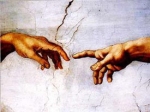Verse: Genesis 15:18 On that day the Lord made a covenant with Abram, saying, “To your offspring I
give[c] this land, from the river of Egypt to the great river, the river Euphrates”.
Read Genesis 15:1-21
From the very beginning at the fall of Adam, YHWH immediately initiated a series of covenants to
restore His broken relationship with mankind. The Bible itself is divided into two major sections called
the “Old” Testament and the “New” Testament. The word “testament” means “covenant”. This division
is a somewhat misleading for many people as it implies on the surface that there are only two
covenants. This thought becomes worse when it is coupled with a “replacement theology”: a belief that
earlier covenants supposedly become null and void as newer covenants are established.
The truth is that there are several covenants established between God and man and these covenants
build upon one another. They never disagree or cancel each other out. Furthermore, the focus and
purpose for every covenant is to restore relationship between God and man. The basis for every
covenant is God’s relentless love towards mankind. Genesis 1:26 states: “Let us make man in our image,
in our likeness”. God called the creation of mankind “very good” as He looked upon us and
contemplated the results. Every other aspect of creation He called “good”, but it is mankind that is the
exceptional pinnacle of His creation.
In every covenant, the covenant partners step into an aspect of their relationship called “hesed” in the Hebrew. Hesed can also be called, “mercy”, “lovingkindness” and “remembrance”. Hesed says, “I always hold you first in my mind, to fulfill the terms of the covenant between us”. “Remembrance”, a similar term says that this relationship is always now, always present and never ending”, “there is nothing more important to me than keeping your welfare and the terms of our agreement toward you”. This type of remembering does not look back to remember something in the past or something that was forgotten as much as it is ever present and “always now“. “Pray without ceasing” (1Timothy 5:17). This reflects the nature of our “remembrance” toward YHWH.
Hesed restores relationship; it exchanges strengths and fills up the weaknesses between covenant
partners. It combines the “two” into “one” by the exchange of individual identities into “one new man”
(Ephesians 2:14-15). Covenant hesed endures for generations, outlasting even the lifetime of the
original partners. Covenant partners are called ”friends”. When the Bible refers to “friends”, it is always
in the context of covenant relationship, not just casual acquaintances.
The Bible is full of this covenant language, and without an understanding of covenanting, we will never
understand God’s purpose or the nature of our relationship to Him. There must be a covenant.
More about covenants.
From Malcom Smith book, The Lost Secret of the New Covenant:
http://escapetoreality.org/2010/11/23/the-lost-secret/
Many of us are not intuitively geared to think in terms of covenants and this affects the way we
receive the gospel. We may confuse covenants with contracts, but they have little in common, as
Malcolm Smith explains:
“A contract is the exchange and passing of property, possessions; a covenant is the exchange of
persons. The contract says, ‘This is now yours,’ while the covenant says, ‘I am now yours.’ So God does not merely promise His impersonal blessings; His blessing is the gift of Himself in the person of the
Holy Spirit.” (p.252)
In Lost Secret, Malcolm Smith unpackages the key ingredients of covenant – the oath, the meal, the
sacrifice, and, most importantly, the representative. Each party in a covenant has a representative.
Who represents humanity in the new covenant? Jesus, our Advocate, Mediator and High Priest (1 Tim
2:5). The first thing you need to know about the new covenant, is that you played no part in setting it
up:
“The new covenant is not made with us as individuals. It is a covenant made by God the Father with
God the Son.” (p.75)
The new covenant is out of our hands and guaranteed by God Himself. This makes it an eternal,
unconditional and unbreakable covenant for God cannot lie. In this arrangement we are like crippled
Mephibosheth being shown kindness by King David because of a covenant made before we were born.
We are the beneficiaries of Jesus’ sacrifice and God’s own oath. Dead religion is based on the
worthless promises of imperfect men, but we stand on the unshakeable oath of God Himself. It is His
promise-keeping – not ours – that provides a “firm and secure” anchor for the soul (Heb 6:19). What
relief! What freedom to know that our eternal security rests in Him:
“I had always thought of my relationship with God as being between God and me… I cannot tell you
what it meant to know that my relationship to God was based on and dependent upon Jesus, who was
acting as me.” (p.224)
The single most important thing I learned about covenant from this book is that God doesn’t need one.
He doesn’t need a covenant to prove His commitment to us, but He makes covenant in order that we
might clearly see His eternal lovingkindness. The gospel is the good news of God’s love expressed to us
in covenant. Why did He make a covenant where He forgives all our sin before we were even born?
Because He loves us with no strings attached! There is no other explanation.
The Bible is full of covenant stories that help us understand the new covenant.
In Lost Secret, Malcolm Smith delves into the rich meaning of words like hesed (the lovingkindness of
God as expressed in covenant) and agape (love that originates in the heart of God and is unaffected by
the loveliness or unloveliness of the object of its affection). These words are essential if we are to
understand the new covenant. After all, God is not human. He doesn’t love in the way humans love.
We completely miss the gospel when we conceive of God as loving only those who are lovely or saving
those who deserve saving. The good news, from start to finish, is God’s idea.
“From the very beginning, the initiative for our salvation has come from God. Humankind has not
asked Him for salvation, nor have we shown any desire to be saved. The newly fallen couple in the
Garden of Eden did not show any signs of repentance… ‘men loved darkness rather than light’.”
(p.118)
After the first covenant in the Garden of Eden (Genesis 3:15), YHWH approached other individuals and
made covenants with them. These men included Noah, Abraham, Isaac, Jacob, Moses, David, and
others. It is important to note that each one of these covenants is with a man, the seed of woman for
sure but not yet “The Seed”--Jesus, the Son of God--who is the ultimate covenant of God with man.
In the process of covenanting with Abraham, YHWH imparted his own name into Abraham. (Genesis
17:1-8) as He did also for Abraham’s wife, Sarah (Genesis 17:15,16). YHWH is not just making excuses
for our bad behaviors, but He is actually imparting His nature back into us. He is doing through covenant
restoration exactly what He intended from the beginning. “Let us make man on our image, in our
likeness” (Genesis 1:26).
In the covenant of Abraham, YHWH promised to create a nation whose God would be YHWH. This was
the first time that YHWH extended a covenant promise to a whole nation. This was a hesed covenant
promise generated and ratified by YHWH himself and the sign of it was through the circumcision of the
flesh. Abraham’s covenant with YHWH could not be fulfilled through natural childbirth. The son
promised to Abraham that would eventually become the first nation devoted to YHWH only came after
all hope of natural childbirth was gone. Abraham believed God and it was the basis of his right standing
with God. As Adam broke relationship and did not believe God, Abraham’s life was restoring God to
man. This is the foundation of Passover which occurred some 400 years later.
In Abraham, God had found himself a man that could be trusted. He imparted His name and nature into
that line and the coming nation of Israel would itself host “the Tent of Meeting” which at that time was
the only place on earth where God could display the tangible Glory of His Presence. God was drawing
near to restore Himself to mankind. It started with a man and developed to become a nation.
Something we need to know.
See Gen 15:7-18
YHWH instructed Abram to prepare a blood covenant sacrifice where the blood of animals represented
the lives of the covenant partners. The rite of blood covenanting demanded that the animals be cut into
two pieces down the middle and the two halves laid open. The “walk of blood” between the two pieces
by EACH participant birthed the covenant agreement itself.
Genesis 15:17-18
When the sun had gone down and it was dark, behold, a smoking fire pot and a flaming torch
passed between these pieces. On that day the Lord made a covenant with Abram. ESV
It was YHWH alone who ratified and swore Himself to fulfill the terms of the covenant with Abraham.
Abraham “believed God and it was a counted to him as righteousness” (Genesis 15:6; Romans 4:3;
James 2:23). This covenant is the foundation for Passover (Genesis 15:12-16) which in itself is a sign,
type, or shadow of the deliverance from sin by the Lamb of God. This was accomplished by Jesus, our
Messiah on the same day of the year as Passover. Jesus’ covenant was likewise ratified between Himself
and the Father. Jesus said of His life, “No one takes it from me, but I lay it down of my own accord”
(John 10:18). Like the covenant of Abraham, it is our belief that grants us entrance into His covenant of
peace between God for the benefit of man. There is nothing of merit, behavior, or law (in the sense of
following rules) that grants us access to the restored relationship with YHWH provided by the Son.
Passover is rooted in the covenants of grace initiated by YHWH. God’s hesed mercy is expressed through
His covenants from the beginning to the end. These covenants are all in agreement with each other and
though they are progressive in nature, they do not cancel each other out. There are all rooted in the
mercy of God, and it is His integrity and love that draws Him to us. This is who He is and He increasingly
imparts not only His benefits, but Himself back into our lives. As Abram’s name was changed to
Abraham, so we now can live out of the actual nature, name, and authority of YHWH.
John 14:12-14
Truly, truly, I say to you, whoever believes in me will also do the works that I do; and greater
works than these will he do, because I am going to the Father. Whatever you ask in my name,
this I will do, that the Father may be glorified in the Son. If you ask me anything in my name, I
will do it. ESV
“A covenant is the exchange of persons” (Malcom Smith). We can see this goal through every covenant
ever established with mankind. It is the foundation of our relationship with God.
There must be a covenant.





Terms & Conditions
Subscribe
Report
My comments